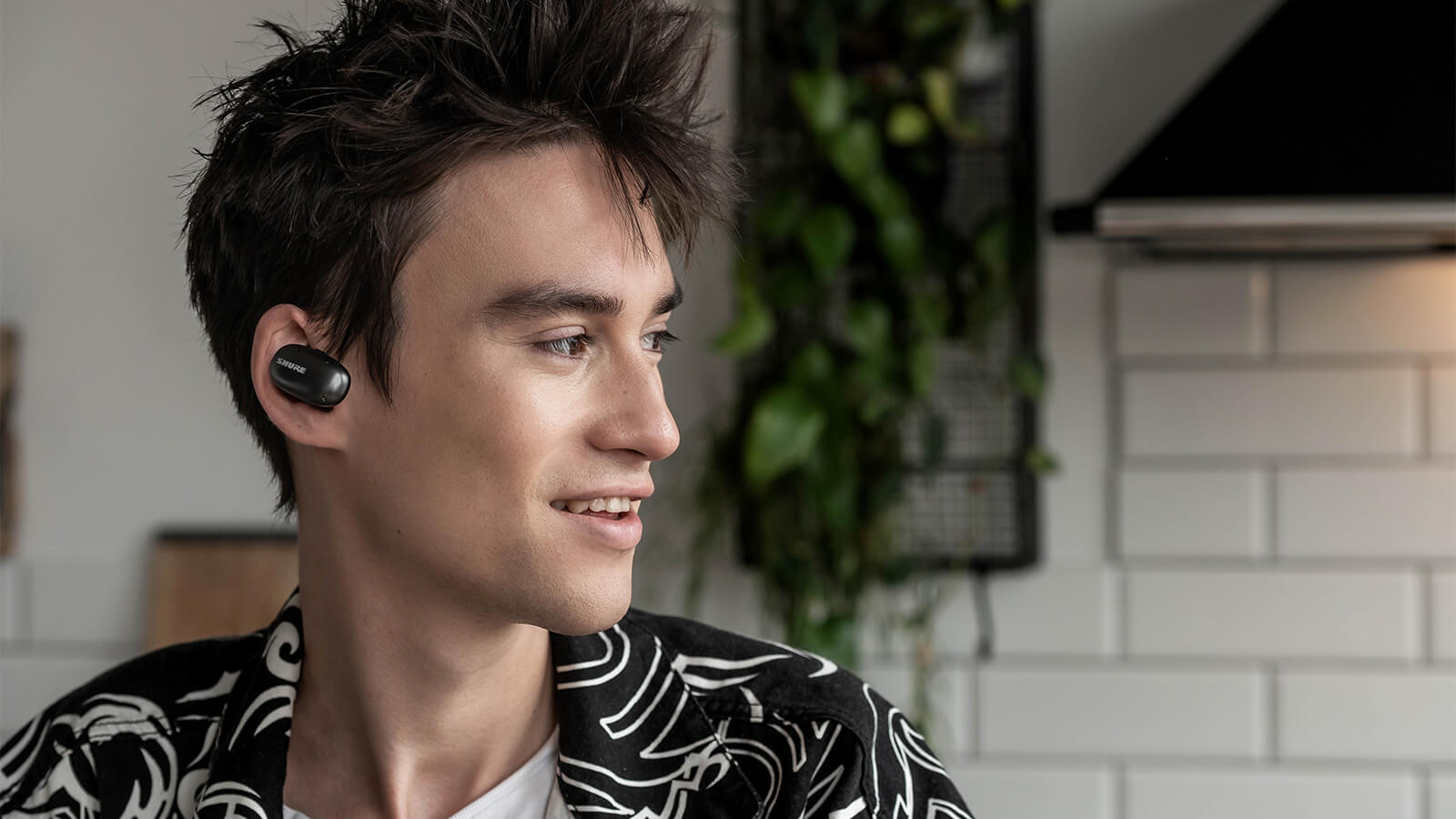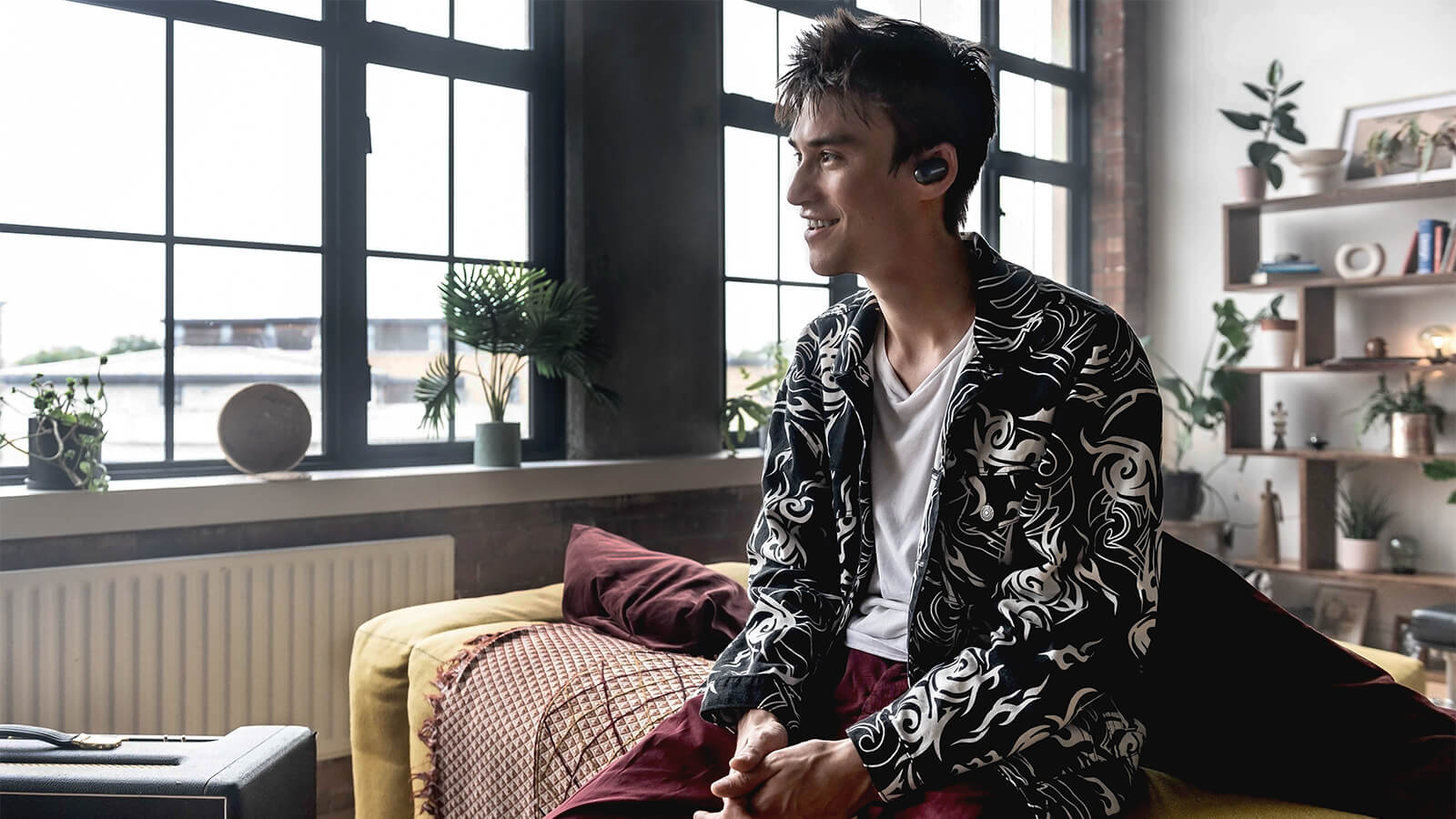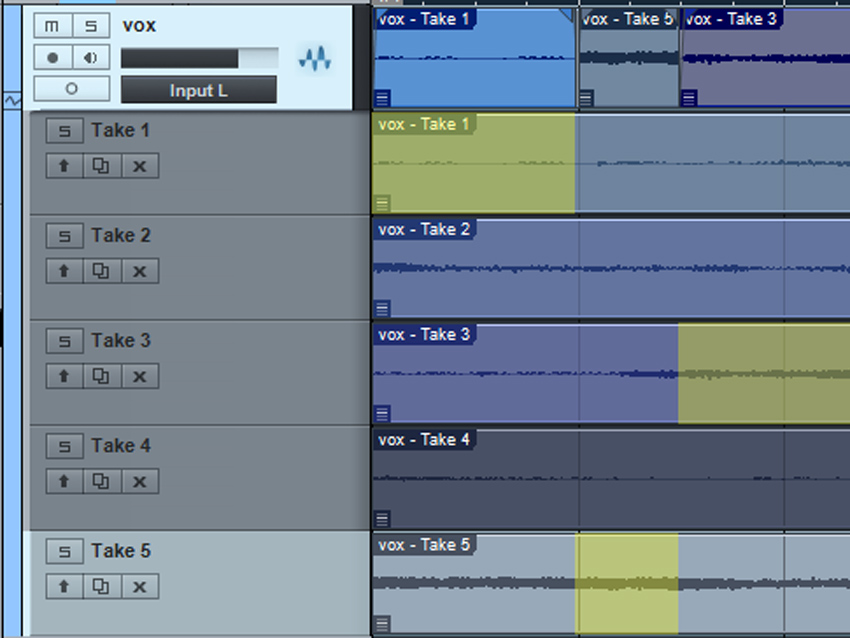Jacob Collier: "I think that unless music is fundamentally simple, it doesn't really move anyone"
The Grammy-winning musical polymath speaks on his home studio space, unique instruments from his collection, and the production techniques that make his music different

The word 'genius' gets thrown around a lot, these days - but when it comes to Jacob Collier, its use is more than justified. Aided by an encyclopaedic knowledge of music theory, heaps of instrumental talent and a restlessly creative spirit, Collier has skyrocketed to the top of the music industry, picking up a bucketful of Grammy Awards along the way.
Speaking to us from his North London home's studio space (that just happens to be the same room in which he learned to walk), Collier opened up about unconventional instruments, the value of simplicity in music, and what drives him to share his creative process with the world.
We’re told that you’ve partnered with Shure for the launch of the AONIC FREE True Wireless earphones. Could you tell us a little about the partnership and your connection to Shure?
“The first microphone that I ever owned in my entire life was an SM58, which I got for my 11th birthday. Shure makes this microphone. This microphone became a bit of a vessel. It was like a bridge from my imagination to the real world. Obviously, every young musician yearns for a canvas of sorts to play with, to experiment with, to create with and for me, that mic was my whole life, it was my whole canvas.
“Shure are responsible for a lot in my musical development, just in terms of giving me the tools and the skills and their permission to be a creative person, which is amazing. I'm extremely grateful. And so, with this particular campaign and with this partnership, I was ultra-thrilled to be able to partner with them.
The truth is there's no right answers at all, you can just do whatever you want to do for the rest of your life creatively
“You know, they're one of the first audio companies to ever really put out a flag in the world and say, look, we are committed to good-sounding stuff. And we're here for the musicians and the creatives, more than we're here for just the consumers and the brands.
“I've always seen Shure as a really artist-friendly bunch of people, and that's super cool. So I’m really thrilled to be working with them on this campaign. And these AONIC FREE wireless earphones, they sound ridiculously good. So I’m basically repping them full-heartedly, from London.”
Get the MusicRadar Newsletter
Want all the hottest music and gear news, reviews, deals, features and more, direct to your inbox? Sign up here.
Talk us through the studio set-up you’re working with at the moment. Are you still working from the home studio that we can see in your Logic session breakdowns?
“Yeah, it is. This is the room I learned to walk in. When I was very young, and it's still my home studio - it didn't look like this when I was born. But essentially, it's a room filled with musical instruments. There's pianos and keyboards and lots of percussion instruments up here. Drum set, bass guitars, electric guitars and guitars, mandolins and ukuleles and charangos, and there's a double bass here. And I've got lots of rack gear here.
This is the room I learned to walk in. I've been recording here for literally 27 years, which is the length of my life
“Here I have all of the microphones that Shure have made, which I've been using recently, that have kind of transformed things. So there's actually Shure microphones that are tucked inside lots of musical instruments.
"There’s Shure mics inside of the piano. And Shure mics on the drums as well, a lot of the time. Tucked around the room are lots of hidden Shure gems. But yeah, Shure, they're so reliably awesome. And so I find myself time and time again being drawn back to just the soundworld that they create, using that soundworld to incorporate in all sorts of things.
“I've been recording here for literally 27 years, which is the length of my life. And actually, last year, I got my hands on a Shure MV88+ which is like a stereo microphone plugged into your phone. And I've always been a really big fan of recording sounds in my life around me, nature sounds on the street, bashing and banging, aeroplane sounds, all sorts of weird stuff.
"And I'll bring those sounds back using this incredible sound that you'd literally just get from an iPhone with a microphone, and bring it into Logic, using it as a sound as I treat any musical instrument. So it's a really kind of dynamic collection of sounds that I'm capable of capturing with Shure and I'm just forever grateful for it.”

Could you pick out three pieces of musical equipment - instruments, synths, effects, software - that were essential to the making of your most recent project?
“Yeah, absolutely. So I guess my heart lives at the piano. I guess maybe for obvious reasons the piano is like such a capacious instrument. It's incredibly descriptive, and you can do all sorts of things with the piano that apply to all of music.
“You can be a drummer on the piano, you can be a singer on the piano, you can be a guitarist or a big gospel choir or brass section or whatever. You can play the whole of music through that instrument. So I tend to sit there a lot of the time and just play, and then from that comes all sorts of weird ideas that I incorporate into all sorts of things.
“Another fantastic device that I've recently really enjoyed is called a harpejji. It's the craziest instrument. I've never really seen anything like this in my whole life, until recently. Essentially it’s a 24-string instrument. The way you play it is by tapping the frets. And it's one of the most incredible sounds - it's a sort of hybrid between a guitar and a clarinet and a piano.
I think that you can have rich, complex music that is really highly descriptive that can at the same time be extremely simple
“You know, it has the twang to it. And you can use vibrato, you can do all sorts of nice flavours and nice things, but you can also get real funky on it, and that's just so fun. So I spend a lot of time with the harpejji. And I'm figuring out how to incorporate it into my world.”
Do you have any hardware synths in the studio?
“I don't currently have any hardware synths, which is kind of weird. It's funny, I never went thoroughly down the hardware synth route. And I tended to veer towards more acoustic instruments. And so almost everything in this room is acoustic, which is all the more reason why, you know, microphones and earphones and studio headphones that sound just completely true to the room, to the way the room sounds, is so critical to me.
“Because, what I want to do when I create is I want to capture the way that this room feels, because this is my ultimate creative haven. So my goal since day one was: how's it feel in the room? And does it sound the same as the room sounds? And if I can match the room, then I'm totally home and dry, because so much of it is acoustic stuff.”
In terms of production techniques - the way you record and produce your music specifically - is there anything that you think you’re doing that makes you sound unique, and really defines your process?
“One thing I like to do a lot of is to layer things on top of each other. I suppose I think kind of orchestrally about pop music and music in general. Because the way that an orchestrator thinks about creating music is, it's like a cook with ingredients, and you find different recipes that you like.
"Harp mixed with piccolo mixed with bassoon, it's like a particular sound is a combination of things rather than just one thing. And so you're like a painter, and you paint them with all these materials. Orchestrators have been doing this for 500 years plus, and I do kind of a similar thing, but with rock and roll gear.

“You think, I'm going to take this drum, and I'm going to combine it with this iPhone sample, mixed with this crazy bass sound. And I'm going to do like 50 vocals. And that's one sound, you know. And so as sounds are sort of crammed in and piled on top of each other, you get this huge combination of sound. Again, a lot of it is acoustic sound. I think that my approach of just layering, I suppose, is fairly unique. Just because there's no limit to the degree to which I'll go to achieve a soundworld that I love.
“I also do a lot of singing. And I don't sing necessarily as a singer, I don't just sing the lead vocal, and then play the band underneath. I tend to sing all sorts of things - I’ll sing the horn parts, sing the bass part, sing the sound effects of percussion, and there's all sorts of voices and they get built up. And that's quite a sort of Jacobian sound, I suppose.
It’s almost as joyful to describe how something is made than it is to just play the thing you’ve made when it's finished
“I guess the last thing I'd say is that I play the instruments myself, which is, I suppose, a little unusual, because normally people have bands, and other people who do stuff. But the nice thing about this room and the way this is riddled with so much cracking Shure gear, is that every instrument is primed at every moment to make sound and to be recorded.
“So I can walk around and play bass or piano or drums or percussion or a weird stringed instrument I picked up in a random country in Asia, and it's going to sound amazing, and it's going to feel like an extension of my natural state, rather than like going to the studio and tracking a whole band of people that I don't know and then coming back and mixing it. It's a really kind of thoroughly interfaced process as far as I'm concerned.”
Your music is quite technically advanced, in terms of both theory and production, but also manages to convey emotion and remain accessible. How do you balance these two considerations?
“I've never been particularly drawn to just technical music, I don't think it really does anything for anyone. But I think that you can have rich, complex music that is really highly descriptive that can at the same time be extremely simple. And I think that unless music is fundamentally simple, it doesn't really move anyone.”
“I always feel like at its base, you're making sounds and putting sounds together and the sounds make you feel stuff. A song is just a song, it's a moment in time. But I think that the degree of resolution that you can go into to craft that intention, to get it just right, and make sure every sound speaks and every ingredient is combined with another ingredient in just the right way, you can go really deeply into that.
“I've always loved exploring and understanding how, for example, harmony works, when you combine notes together to make chords, and also rhythm. If you really dig into those concepts, they go really, really, really deep. And the deeper they go, the more emotional devices you have as a storyteller to convey a particular thing. But ultimately, I don’t think too much about the things I create, I don't try and achieve a balance of anything. I just think, Oh, this is cool. I'll do this today, you know.”
Unlike many artists, you open up the music making process to your fans, giving them an insight into how your music is made through your YouTube and TikTok content. What motivates you to do this?
“I just love it, man. It's super interesting to me how music is made. It’s almost as joyful to describe how something is made than it is to just play the thing you’ve made when it's finished. Because there's so much of the process, about how you craft the sound and how you imagine the sound and where the microphone is when you record the sound and what the intention is behind it. All these things are really interesting.
“I get a real kick out of opening up the process and sharing it with people because I think that, nowadays, especially the creative ecosystem is very open source. And people are just sharing creative DNA really easily. I think it's amazing, especially with things like TikTok and YouTube now, it’s becoming a free for all and people are just exploding with creative energy, saying: oh, how did you do this? Which microphone did you use to record that? And what was that, why did you do this and this?
"And sometimes you can say, oh, I did this chord, because I thought it would go well with a chord that comes next or the chord that goes before. But oftentimes you think well, I don't know why I did that. It's just cool.
I think that the more these ideas are shared between creative people in the world right now, the more interesting everyone's creative lives are going to be
“I think one of the things about producing music and doing that full time is that there's all these different ways in which you can be a musician and engage with that process. There's just the raw energy of being excited and having an idea. And then there's the refining of that idea into a song and a structure. And then there's recording the sounds that create that song and putting them in the right place. And then there's crafting and honing those sounds in terms of the mix, you know what sounds are different volumes and how you sculpt sounds with EQ and things like that.
“And then there's how you master the whole song, or how that song fits into the whole album. And then there's how you package that for social media, you know, whether you make a video, and how you edit the video, and what kind of vibe the video is. And then it's how you get the word out about it, how you share it with people, and then it's how you perform it on a stage.
“You know, there's all these different ways in which you can approach music. I think that the more these ideas are shared between creative people in the world right now, especially young people who are coming up and trying to figure out how it all works, the more interesting everyone's creative lives are going to be.
“I think there's this illusion when you're growing up as a musician that being a recording artist who is successful, it's like a really high art-thing, and you have to be really qualified to do stuff and you have to know the right answers. The truth is there's no right answers at all, you can just do whatever you want to do for the rest of your life creatively, you can do whatever you want to do. So I think a lot of the work that I do when I talk to people, I'm doing because I want to free people from thinking there are rules.
“There aren't rules, the only rule is that you have your intuition and you should be true to that, because I think if you're true to that, then you're gonna have the most fun. So I like explaining how I think about things and challenging people to think in new ways. And that's always brought me a lot of joy and continues to do so.”
Jacob Collier heads out on tour in February 2022.
Shure’s AONIC FREE True Wireless Earphones are available now.



I'm MusicRadar's Tech Editor, working across everything from product news and gear-focused features to artist interviews and tech tutorials. I love electronic music and I'm perpetually fascinated by the tools we use to make it. When I'm not behind my laptop keyboard, you'll probably find me behind a MIDI keyboard, carefully crafting the beginnings of another project that I'll ultimately abandon to the creative graveyard that is my overstuffed hard drive.









